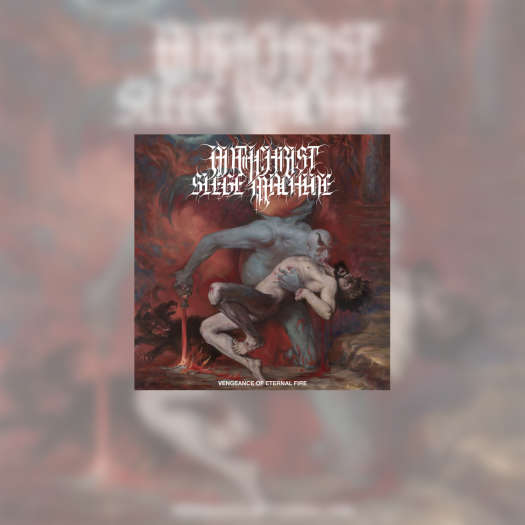There's something spiritual in Natalie Mering's sweeping alto. On her fourth album, Front Row Seat to Earth, the singer-songwriter and multi-instrumentalist, who records as Weyes Blood, evokes the 1970s with a voice that sounds even older, singing love songs that double as social commentary on the futuristic, often alienating times we live in.
On Front Row, Weyes Blood, who sang backup vocals on Ariel Pink's Mature Themes and used to perform as part of experimental rock band Jackie-O Motherfucker, writes hookier melodies to pull you deeper into the bittersweet drama of her lyrics, a development even from 2014's The Innocents. Now that Front Row Seat to Earth is out now on Mexican Summer, Mering talked to Exclaim! about the impact of the future and influence of the past.
Front Row Seat to Earth is about feeling disconnected despite the "front row seat" that our technology provides.
A cursory viewing of Blood's self-directed dystopian video for "Generation Why" — which contrasts discarded old technology and an abandoned warehouse with a shiny new iPhone — reveals an artist who's fully cognizant of and immersed in the digital era, though she remembers the past.
But according to Mering, it was the theatre, not cinema, that she had in mind.
"I was thinking of a stage where there is a performance," she says. "You're trying to get close to the action; there's supposed to be no barrier. It's kind of symbolic of being in a first world country and witnessing the globalized community and how our perception of the world is a bit disconnected. [Because of] the internet and the way we absorb information, it's kind of like we're watching from the safety on an audience standpoint. [We're] still in the front row, but we don't feel part of it. We're participating in everything that's going on but we're still reading the news and seeing things separate from ourselves. The iPhone is this personal front row seat into what's going on, but you're just looking into a screen that's in your lap; it's still not maybe connecting you any more to the people that you're talking to on it."
Electronics symbolize freedom.
"I've always been very progressive and as much as I play Old World music, I have this progressive tenacity to keep adding futuristic elements in subtle ways where you won't notice," Mering says. "So there are a lot of weird digital things going on on the record that blend in with the folk in a way where they're not jarring. They're very futuristic. I look forward to getting deeper on that on the next one and exploring more synthesizers and things like that. I come from an experimental music background so that stuff to me is very exciting and innovative. It's endless."
Her musical soul is drawn to the 1970s.
If Natalie Mering could take a time machine anywhere, it would be to the early 1970s. "The Renaissance is amazing, but then there's the plague," she reasons. "The Gilded Age is pretty amazing; being around during the Titanic and the beginning of film and things like that.
"But because I reference so much music from that time, I'd go to the early '70s to dispel all the myths that are surrounding that time. If I were to go to shows and see the bands that I admire I would probably realize that they're all misogynist pigs and that women were treated way differently."
Check out the intersection of the past and future in the "Generation Why" video below.
On Front Row, Weyes Blood, who sang backup vocals on Ariel Pink's Mature Themes and used to perform as part of experimental rock band Jackie-O Motherfucker, writes hookier melodies to pull you deeper into the bittersweet drama of her lyrics, a development even from 2014's The Innocents. Now that Front Row Seat to Earth is out now on Mexican Summer, Mering talked to Exclaim! about the impact of the future and influence of the past.
Front Row Seat to Earth is about feeling disconnected despite the "front row seat" that our technology provides.
A cursory viewing of Blood's self-directed dystopian video for "Generation Why" — which contrasts discarded old technology and an abandoned warehouse with a shiny new iPhone — reveals an artist who's fully cognizant of and immersed in the digital era, though she remembers the past.
But according to Mering, it was the theatre, not cinema, that she had in mind.
"I was thinking of a stage where there is a performance," she says. "You're trying to get close to the action; there's supposed to be no barrier. It's kind of symbolic of being in a first world country and witnessing the globalized community and how our perception of the world is a bit disconnected. [Because of] the internet and the way we absorb information, it's kind of like we're watching from the safety on an audience standpoint. [We're] still in the front row, but we don't feel part of it. We're participating in everything that's going on but we're still reading the news and seeing things separate from ourselves. The iPhone is this personal front row seat into what's going on, but you're just looking into a screen that's in your lap; it's still not maybe connecting you any more to the people that you're talking to on it."
Electronics symbolize freedom.
"I've always been very progressive and as much as I play Old World music, I have this progressive tenacity to keep adding futuristic elements in subtle ways where you won't notice," Mering says. "So there are a lot of weird digital things going on on the record that blend in with the folk in a way where they're not jarring. They're very futuristic. I look forward to getting deeper on that on the next one and exploring more synthesizers and things like that. I come from an experimental music background so that stuff to me is very exciting and innovative. It's endless."
Her musical soul is drawn to the 1970s.
If Natalie Mering could take a time machine anywhere, it would be to the early 1970s. "The Renaissance is amazing, but then there's the plague," she reasons. "The Gilded Age is pretty amazing; being around during the Titanic and the beginning of film and things like that.
"But because I reference so much music from that time, I'd go to the early '70s to dispel all the myths that are surrounding that time. If I were to go to shows and see the bands that I admire I would probably realize that they're all misogynist pigs and that women were treated way differently."
Check out the intersection of the past and future in the "Generation Why" video below.




